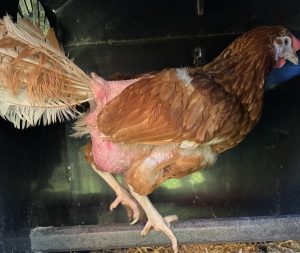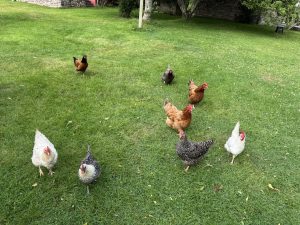A few weeks ago we decided to adopt three ex-battery hens to add to our existing flock. The British Hen Welfare Trust was set up to rescue as many of these hens as possible, and as they had a distribution point near Boncath, North Pembrokeshire, we thought ‘let’s give it a go’. We have had rescue-hens before but never directly coming from their previously caged existence, so we were not sure what state these hens would be in. The three that came home with us were in various stages of having lost their feathers, and their combs, faces and skin were terribly pale. It is not surprising, having been in cages with only one “A4 plus a postcard size” per bird maximal, never having seen or felt the sun, never having been able to scratch, walk and what have you, for all of the 18 months of their life. It does not bear imagining.

All three hens had to learn what it is to have space to explore, to sand-bathe, to scratch, catch insects from the air and even to go to roost on a perch. Very tentatively they came out of the small coop we set aside for them and started to explore the temporary run we have set up. Each day they explored a little bit further and by now they are used to us and like to socialise through the netting with all our other hens. Not long to go and we shall combine these three with the other nine in the large coop and they will be able to explore the whole of our premises.
One of the three hens was especially sad looking, but three weeks in, little feathers are starting to re-appear again on previously bare skin. In a few months time she should be unrecognisable from when we got her and more like the rest of our current flock which, we are proud to say, look amazingly happy and healthy thanks to their free-roaming life at Rosemoor. And that is how these wood-animals should live, as far as we (and our guests!) are concerned. They are such entertaining birds, all with their own peculiarities. Almost nothing is as relaxing as watching a lovely flock of hens going about their business, having a nosey around your chair and come running when we call them at the end of the afternoon for their mixed poultry corn treat. It never fails to delight our guests either, and children love it when they can help feeding them, and we – in turn – love it when we can educate them about these birds and their habits. On top of that they lay the most marvelous eggs. What is not to love …

The picture of our original flock of hens shows what happy chickens should look like. If you are with us of the opinion that battery hen egg production should be banned then please support the British Hen Welfare Trust and the RSPCA to help achieve that. It is an aim very close to our hearts.
